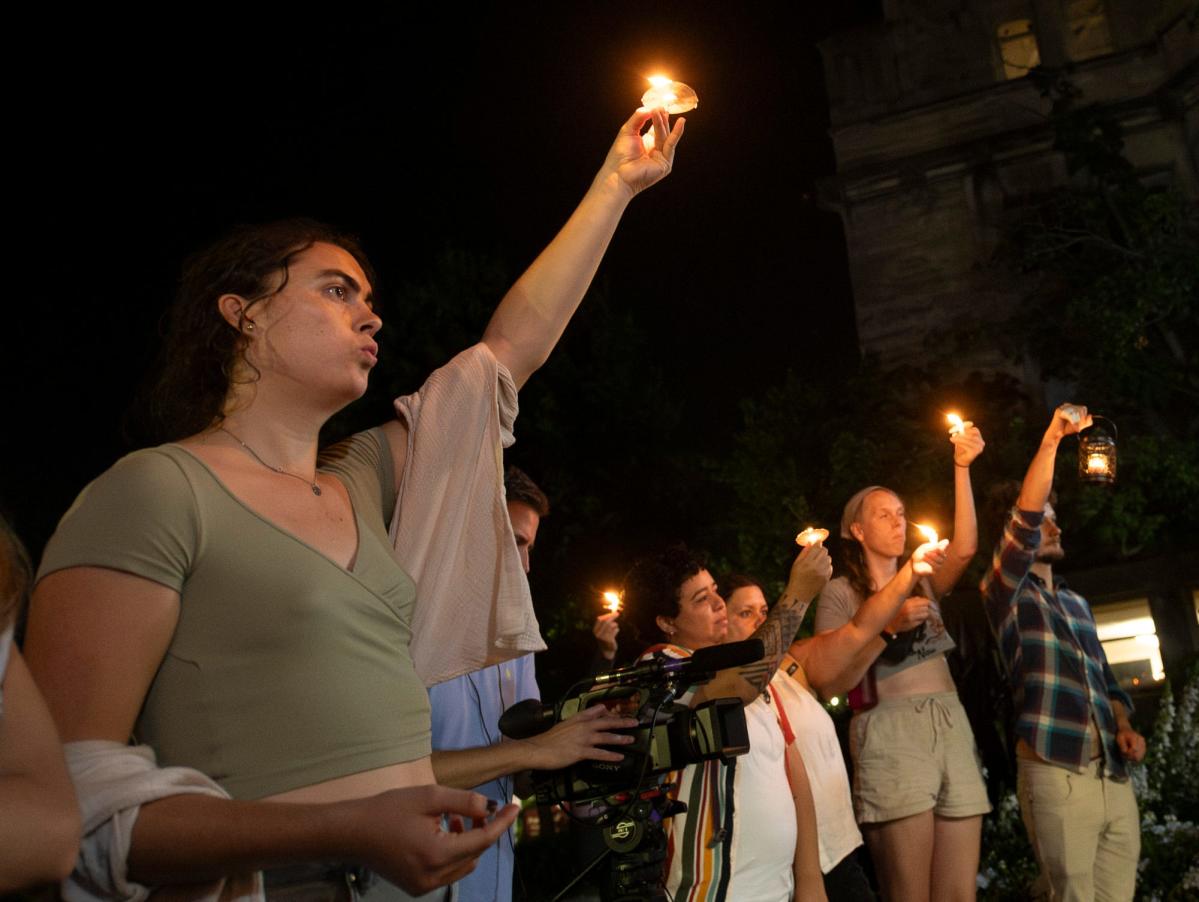It looks like Indiana University is sticking with its controversial expressive activity policy after all.


For weeks, IU has been monitoring, giving warnings and even threatening termination to those attending a weekly candlelight vigil that takes place after 11 p.m. on Sundays, an intentional violation of IU’s expressive activity policy.
An unexpected approval from IU confuses organizers
After ESPN’s College GameDay program sparked questions about why students who held signs and camped out overnight on university property weren’t in violation of the policy, professor Heather Akou decided to seek approval for a candlelight vigil. Akou’s request stated the event “to discuss and exercise our First Amendment Rights” would begin at 10:30 p.m. on Nov. 10.
Upon getting a fast approval, Akou asked whether she needed to specify when the event would end. The response Akou received stated, “Nonamplified sound is okay past 11pm, and so are candles assuming they are not fixated to the ground in any way.”
More: Did Indiana University change its controversial free speech policy? What we know.
When pressed by reporters on whether the policy had changed, however, IU backpedaled. “There has been no change to the Expressive Activity Policy,” IU spokesperson Mark Bode said.
Michael Kersteff, the IU events system specialist who approved the request, followed up with Akou saying, “the event must conclude no later than 11:00 p.m.”
Everything IU has said about the approval and policy so far
Here’s what IU officials have said about the policy and approval so far:
-
Oct. 31: In his initial approval, Kersteff said, “You must follow all University policies specifically, UA-10 … Specifically, please note the time restrictions which means any amp sound, signs, symbols, or structures must be removed or concluded by 11pm.”
-
Oct. 31: When Akou asked whether the event could continue past 11 p.m. with non-amplified sound, Kersteff said, “Nonamplified sound is okay past 11pm, and so are candles assuming they are not fixated to the ground in any way.”
-
Nov. 4: When asked by The Herald-Times if the policy had changed, IU spokesperson Mark Bode said, “There has been no change to the Expressive Activity Policy.”
-
Nov. 4: In response to a question about Kersteff’s approval of the event continuing past 11 p.m., Bode responded, “Events Management received a submission request for an event scheduled to start at 10:30pm on Sunday, November 10. The requestor did not mark the event as one pertaining to expressive activity, and the requestor’s questions were answered with that understanding. Under the Expressive Activity Policy, expressive activity is permitted until 11:00pm. Events Management will follow up with the requestor to provide an opportunity to update the submission.” According to a screenshot shared by Akou, the request form does not have a place to identify whether the event is “one pertaining to expressive activity.” Bode did not clarify how Akou was to “mark” the event as such.
-
Nov. 5: Kersteff sends a follow-up email to Akou, saying, “While your event is approved to begin at 10:30 p.m., please be advised that the event must conclude no later than 11:00 p.m. in conformance with UA-10 … that remains in full effect and prohibits expressive activity between the hours of 11 p.m. and 6 a.m.”
-
Nov. 7: When asked by The Herald-Times if a vigil was inherently considered an expressive activity, and whether late-night events like IU’s Dance Marathon (which runs well past 11 p.m.) are considered expressive activity, IU spokesperson Teresa Mackin said, “Approved IU events are not considered expressive activity.”
-
Nov. 7: When asked by The Herald-Times if the vigil was an approved event, and therefore not considered an expressive activity, Mackin resent Bode’s Nov. 4 statement about “the requestor” not specifying expressive activity.
Will the vigils continue to violate IU’s free speech policy?
Russ Skiba, a vigil organizer, said IU was struggling to enforce its own policy, which he said administrators know to be overbroad and “unenforceable.”


“They can’t enforce it without getting into just all sorts of logical issues,” Skiba said. “They’re tying themselves into knots trying to enforce it.”
In response, Skiba says the candlelight vigils are likely to continue.
“It clearly is not going to be a celebration that we’ve won, that we’ve changed the policy,” Skiba said. “But we were successful in showing the sheer arbitrariness and inconsistency in IU’s enforcement of what’s clearly going to continue to be a problematic policy.”
Reach Brian Rosenzweig at brian@heraldt.com. Follow him on Twitter/X at @brianwritesnews.
This article originally appeared on The Herald-Times: IU approves vigil that violates expressive activity policy


Leave a Comment